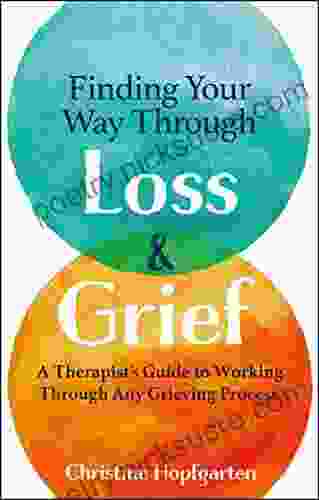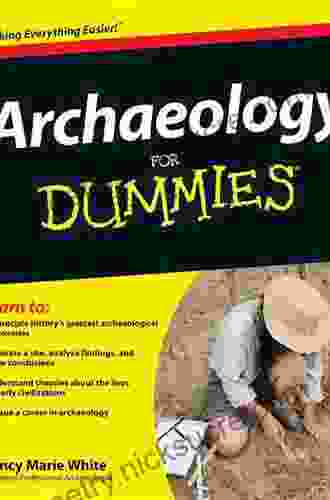Archaeology For Dummies: A Comprehensive Guide to the Past

Archaeology is the study of human history through the excavation and analysis of material remains. It is a fascinating field that can tell us about the lives of our ancestors, the cultures they created, and the environments in which they lived.
Archaeology For Dummies is the perfect to the exciting world of archaeology. This comprehensive guide covers everything you need to know to get started, from the basics of archaeological theory to the latest techniques and discoveries.
In this book, you will learn about:
4.5 out of 5
| Language | : | English |
| File size | : | 2222 KB |
| Text-to-Speech | : | Enabled |
| Screen Reader | : | Supported |
| Enhanced typesetting | : | Enabled |
| Word Wise | : | Enabled |
| Print length | : | 563 pages |
| Lending | : | Enabled |
- The different types of archaeological sites
- The methods archaeologists use to excavate and analyze remains
- The major archaeological discoveries that have shaped our understanding of the past
- The ethical issues that archaeologists face
- The career opportunities available in archaeology
Whether you are a student, a history buff, or simply someone who is curious about the past, Archaeology For Dummies is the perfect resource for you.
Chapter 1: What is Archaeology?
Archaeology is the study of human history through the excavation and analysis of material remains. This can include anything from ancient tools and weapons to buildings and monuments. Archaeologists use these remains to learn about the lives of our ancestors, the cultures they created, and the environments in which they lived.
Archaeology is a relatively new field, with the first scientific excavations taking place in the 19th century. However, the roots of archaeology can be traced back to the ancient Greeks, who were fascinated by the ruins of their own civilization.
Today, archaeology is a global discipline, with archaeologists working in every corner of the world. They have made important discoveries about human history, including the origins of agriculture, the development of cities, and the rise and fall of civilizations.
Chapter 2: Archaeological Methods
Archaeologists use a variety of methods to excavate and analyze material remains. These methods include:
- Excavation: The process of digging up a site to uncover buried remains.
- Survey: The process of searching for and recording archaeological sites.
- Remote sensing: The use of technology to detect buried remains without excavation.
- Analysis: The process of studying and interpreting archaeological remains.
Archaeologists use these methods to learn about the past in a variety of ways. For example, they can use excavation to uncover the remains of a house to learn about the layout of the building and the way people lived in it. They can use survey to identify the location of a prehistoric settlement and learn about the size and shape of the community. And they can use remote sensing to detect the presence of buried remains, such as a ship wreck or a lost city.
Chapter 3: Major Archaeological Discoveries
Archaeology has made many important discoveries about human history. These discoveries include:
- The origins of agriculture: Archaeologists have found evidence that agriculture began in the Middle East around 10,000 years ago. This discovery has helped us to understand how humans made the transition from hunting and gathering to farming.
- The development of cities: Archaeologists have found evidence that the first cities were built in Mesopotamia around 5,000 years ago. These cities were home to large populations and were centers of trade and culture.
- The rise and fall of civilizations: Archaeologists have studied the rise and fall of many civilizations, including the ancient Egyptians, the Greeks, and the Romans. These studies have helped us to understand the factors that contribute to the success and failure of civilizations.
Chapter 4: Ethical Issues in Archaeology
Archaeology is a powerful tool that can be used to learn about the past. However, it is important to use this tool responsibly. Archaeologists have a responsibility to protect the sites they excavate and to respect the cultures they study.
Some of the ethical issues that archaeologists face include:
- The destruction of archaeological sites: Archaeological sites are often fragile and can be easily damaged by excavation. Archaeologists must take care to minimize the impact of their work on these sites.
- The looting of archaeological sites: Archaeological sites are often looted for their valuable artifacts. This looting can damage the sites and deprive future generations of the opportunity to learn from them.
- The repatriation of archaeological remains: Archaeologists sometimes excavate remains that are of great cultural significance to indigenous peoples. These remains should be repatriated to the appropriate communities so that they can be properly cared for and studied.
Chapter 5: Career Opportunities in Archaeology
Archaeology is a rewarding career that offers a variety of opportunities. Archaeologists can work in a variety of settings, including universities, museums, government agencies, and private companies.
Some of the career opportunities available in archaeology include:
- Field archaeologist: Field archaeologists conduct excavations and surveys to uncover and document archaeological remains.
- Laboratory archaeologist: Laboratory archaeologists analyze archaeological remains to learn about the past.
- Museum archaeologist: Museum archaeologists curate and exhibit archaeological collections.
- Government archaeologist: Government archaeologists work for government agencies to protect and manage archaeological resources.
- Private sector archaeologist: Private sector archaeologists work for companies that provide archaeological services to clients, such as developers and construction companies.
Archaeology is a challenging but rewarding field that offers a unique opportunity to learn about the past. If you are interested in history, culture, and the human experience, then archaeology may be the perfect career for you.
4.5 out of 5
| Language | : | English |
| File size | : | 2222 KB |
| Text-to-Speech | : | Enabled |
| Screen Reader | : | Supported |
| Enhanced typesetting | : | Enabled |
| Word Wise | : | Enabled |
| Print length | : | 563 pages |
| Lending | : | Enabled |
Do you want to contribute by writing guest posts on this blog?
Please contact us and send us a resume of previous articles that you have written.
 Fiction
Fiction Non Fiction
Non Fiction Romance
Romance Mystery
Mystery Thriller
Thriller SciFi
SciFi Fantasy
Fantasy Horror
Horror Biography
Biography Selfhelp
Selfhelp Business
Business History
History Classics
Classics Poetry
Poetry Childrens
Childrens Young Adult
Young Adult Educational
Educational Cooking
Cooking Travel
Travel Lifestyle
Lifestyle Spirituality
Spirituality Health
Health Fitness
Fitness Technology
Technology Science
Science Arts
Arts Crafts
Crafts DIY
DIY Gardening
Gardening Petcare
Petcare Ray Moynihan
Ray Moynihan Mishka Shubaly
Mishka Shubaly Anne Sylvie Malbrancke
Anne Sylvie Malbrancke Isaac Fitzsimons
Isaac Fitzsimons Stacey Williams
Stacey Williams Charles J Sanders
Charles J Sanders Sally Annjanece Stevens
Sally Annjanece Stevens Barry Schwartz
Barry Schwartz Stuart Tomlinson
Stuart Tomlinson Barak A Bassman
Barak A Bassman Kristina Cowan
Kristina Cowan Jill Lepore
Jill Lepore Lina Beard
Lina Beard Louise Katz
Louise Katz Dante Fortson
Dante Fortson Jennifer Dugan
Jennifer Dugan Tarani Chandola
Tarani Chandola Michael Tan
Michael Tan Anna Wood
Anna Wood James Burke
James Burke Neal Shusterman
Neal Shusterman Alex Bromley
Alex Bromley M Terese Verklan
M Terese Verklan Victor Stringer
Victor Stringer Paul Logothetis
Paul Logothetis Genevieve Mckay
Genevieve Mckay Mordecai Orimiladeye
Mordecai Orimiladeye Hope Comerford
Hope Comerford Fox Fisher
Fox Fisher Tyler Richards
Tyler Richards Creative Guy
Creative Guy Tony Osgood
Tony Osgood Tali Sharot
Tali Sharot Zena Hitz
Zena Hitz Ann Zaprazny
Ann Zaprazny Darcie Little Badger
Darcie Little Badger James F Twyman
James F Twyman Ray Eye
Ray Eye Steven Munatones
Steven Munatones Ichigo Takano
Ichigo Takano Steven Callahan
Steven Callahan Linda K Miller
Linda K Miller Darryl Belfry
Darryl Belfry Lexi Ryan
Lexi Ryan Chase Hassen
Chase Hassen Bren Smith
Bren Smith Pradeepa Narayanaswamy
Pradeepa Narayanaswamy Anna Bright
Anna Bright Dan Koboldt
Dan Koboldt Dean Buonomano
Dean Buonomano John Van Wyhe
John Van Wyhe Nicholas Clapp
Nicholas Clapp Paul Mendelson
Paul Mendelson Charles Dickens
Charles Dickens R K Agarwal
R K Agarwal Skeleton Steve
Skeleton Steve Ken Robinson
Ken Robinson Rick Page
Rick Page Aaron Mahnke
Aaron Mahnke Suzanne I Barchers
Suzanne I Barchers Eddie Jones
Eddie Jones Zoe Moore
Zoe Moore Shawn Shallow
Shawn Shallow Gilbert J Grant Md
Gilbert J Grant Md Sandy Camillo
Sandy Camillo W W Sawyer
W W Sawyer Craig Ramsay
Craig Ramsay Marie Cirano
Marie Cirano Jessa Stone
Jessa Stone Larry Semento
Larry Semento Nisha Garg
Nisha Garg Stacey A Shannon
Stacey A Shannon Anna Grafl
Anna Grafl Livia Bitton Jackson
Livia Bitton Jackson Vittal S Anantatmula
Vittal S Anantatmula Louis Van Dyke
Louis Van Dyke Helen Adrienne
Helen Adrienne Brian Daccord
Brian Daccord Vladimir Vasiliev
Vladimir Vasiliev Chris Gore
Chris Gore Good Books
Good Books Asker Jeukendrup
Asker Jeukendrup Clive Scarff
Clive Scarff Cb Droege
Cb Droege L J Smith
L J Smith Christine Hopfgarten
Christine Hopfgarten Noel D Justice
Noel D Justice James P Sethna
James P Sethna Frances Schultz
Frances Schultz Katie Krimer Ma Lcsw
Katie Krimer Ma Lcsw Matthew Locricchio
Matthew Locricchio Melvin Fitting
Melvin Fitting Gemma Bray
Gemma Bray Steven G Krantz
Steven G Krantz Jenna Evans Welch
Jenna Evans Welch Joy Dawson
Joy Dawson Silvia M Lindtner
Silvia M Lindtner Lisa Manterfield
Lisa Manterfield Michael Witwer
Michael Witwer Larry Thornberry
Larry Thornberry Peter Hathaway Capstick
Peter Hathaway Capstick Earl Hipp
Earl Hipp Kass Morgan
Kass Morgan Zach Codings
Zach Codings Rutger Bregman
Rutger Bregman Peter Watson
Peter Watson Anna Della Subin
Anna Della Subin Richard C Schwartz
Richard C Schwartz Sam Demas
Sam Demas John Murray
John Murray Sparknotes
Sparknotes Joshua Shifrin
Joshua Shifrin Julie Plagens
Julie Plagens Wendy Leo Smith
Wendy Leo Smith Mikael Lindnord
Mikael Lindnord John Gignilliat
John Gignilliat Julie A Ross
Julie A Ross Lane Demas
Lane Demas Lori L Tharps
Lori L Tharps Kristen L Mauk
Kristen L Mauk Christine Field
Christine Field Julian Of Norwich
Julian Of Norwich Sajni Patel
Sajni Patel George Lakoff
George Lakoff Johnny Chuong
Johnny Chuong Sean Purchase
Sean Purchase Cade Courtley
Cade Courtley Harnarayan Singh
Harnarayan Singh Anna Crowley Redding
Anna Crowley Redding Rebecca Carroll
Rebecca Carroll Julia Galef
Julia Galef Jack Perconte
Jack Perconte Marjorie Savage
Marjorie Savage Annaka Harris
Annaka Harris Fumio Sasaki
Fumio Sasaki John Pullen
John Pullen Christina Henry De Tessan
Christina Henry De Tessan H Jerome Chapman
H Jerome Chapman Sara Dyer
Sara Dyer Crystal Cook
Crystal Cook Melanie Dickerson
Melanie Dickerson David Woods
David Woods Holly Bourne
Holly Bourne Malcolm S Thaler
Malcolm S Thaler Joey Myers
Joey Myers Bella Forrest
Bella Forrest Graham Robb
Graham Robb Tanmay Mehta
Tanmay Mehta Steve Newell
Steve Newell Kendall Coyne
Kendall Coyne Kalman Samuels
Kalman Samuels Tara Haelle
Tara Haelle Jonathan Pd Buckley
Jonathan Pd Buckley C J Brown
C J Brown David Soucie
David Soucie Sharman Apt Russell
Sharman Apt Russell Prime Hall
Prime Hall Annabel Streets
Annabel Streets Jacqueline Winslow
Jacqueline Winslow Roger Hall
Roger Hall Kristian Berg
Kristian Berg Sally Black
Sally Black Carl Mckeating
Carl Mckeating Dan Gardner
Dan Gardner Krista Marson
Krista Marson Philip Gibson
Philip Gibson Maya Van Wagenen
Maya Van Wagenen Martin N Seif
Martin N Seif Chris Fregly
Chris Fregly Julie C Meloni
Julie C Meloni Ford R Bryan
Ford R Bryan Robert Gerver
Robert Gerver Steve Schwartz
Steve Schwartz Barbara Sealock
Barbara Sealock Adele Faber
Adele Faber Shelley Emling
Shelley Emling Mark Mckinney
Mark Mckinney Jay Allan
Jay Allan Ian Moulding
Ian Moulding L A Cotton
L A Cotton Hannah Testa
Hannah Testa Sukhveer Singh
Sukhveer Singh Joanna Wells
Joanna Wells Peter Richmond
Peter Richmond Sean Bartram
Sean Bartram June Hur
June Hur Cathy Glass
Cathy Glass Bob Cary
Bob Cary Roy R Grinker
Roy R Grinker Steve Oldenburg
Steve Oldenburg Dave Hughes
Dave Hughes Wayne C Booth
Wayne C Booth Robin Esrock
Robin Esrock Freddy Silva
Freddy Silva Damian Hall
Damian Hall Sandy Bodeau
Sandy Bodeau Illustrated Edition Kindle Edition
Illustrated Edition Kindle Edition Tim Cahill
Tim Cahill Todd Denault
Todd Denault Jennifer Kostick
Jennifer Kostick Jennifer L Lopez
Jennifer L Lopez Jean Barbre
Jean Barbre L J Martin
L J Martin Richard Appleton
Richard Appleton Gill James
Gill James Ralph Cockburn
Ralph Cockburn Sara Wickham
Sara Wickham William P Young
William P Young Rick Sparkman
Rick Sparkman Matthew Rudy
Matthew Rudy Eleanor J Sullivan
Eleanor J Sullivan Randy J Paterson
Randy J Paterson Margaret Jean Langstaff
Margaret Jean Langstaff Justine Gregory Williams
Justine Gregory Williams Susan G Solomon
Susan G Solomon Todd Radom
Todd Radom Anna Quindlen
Anna Quindlen John Edwards
John Edwards Steve Bennett
Steve Bennett Trevor Hartman
Trevor Hartman Jeff Kuehl
Jeff Kuehl Peyton Curley
Peyton Curley Stan Gibilisco
Stan Gibilisco Christopher Seddon
Christopher Seddon Harold Davis
Harold Davis Chris Bailey
Chris Bailey Luke Schumacher
Luke Schumacher Patricia Ladis
Patricia Ladis Angela Saini
Angela Saini Anna Lowenhaupt Tsing
Anna Lowenhaupt Tsing Richard A Swanson
Richard A Swanson Mark Matlock
Mark Matlock Winton Porter
Winton Porter Shannon Vallor
Shannon Vallor Ben Shneiderman
Ben Shneiderman Barry Dainton
Barry Dainton Ann Mccallum Staats
Ann Mccallum Staats Guy Windsor
Guy Windsor Katharine Beals
Katharine Beals Robert A Cook
Robert A Cook Roy M Wallack
Roy M Wallack Kathy Morey
Kathy Morey Julian Havil
Julian Havil Kate Mcvaugh
Kate Mcvaugh Bruce Lockwood
Bruce Lockwood Sean Covey
Sean Covey Nelson Dellis
Nelson Dellis James C Zimring
James C Zimring Daniel Isberner
Daniel Isberner Sheela Raja
Sheela Raja Les Livingstone
Les Livingstone John Baichtal
John Baichtal Jacob Ward
Jacob Ward M Shawn Copeland
M Shawn Copeland Caryl Phillips
Caryl Phillips Emmett W Hines
Emmett W Hines Horace Freeland Judson
Horace Freeland Judson Jackie Bolen
Jackie Bolen Michael Burnett
Michael Burnett College Hippo
College Hippo Rebecca A Moyes
Rebecca A Moyes Ann Valett
Ann Valett Lisa Randall
Lisa Randall Caroline Miller
Caroline Miller Thomas A Garrity
Thomas A Garrity Heidi Kreider
Heidi Kreider Howard Means
Howard Means Suzanne Clark
Suzanne Clark Scott Allan
Scott Allan Matthew Cobb
Matthew Cobb Maggie Downs
Maggie Downs Jay Young
Jay Young Annalyn Ng
Annalyn Ng Antonio Robert
Antonio Robert Stephanie Cave
Stephanie Cave L Chapman
L Chapman Buddy Lee
Buddy Lee Tim Young
Tim Young Dana James
Dana James Jonathan R Brennan
Jonathan R Brennan Richard Mcafee
Richard Mcafee Breeda Bermingham
Breeda Bermingham Reinhard Kleist
Reinhard Kleist Valerie Hansen
Valerie Hansen Margaret Paul
Margaret Paul Frank Thomas
Frank Thomas Suzanne Girard Eberle
Suzanne Girard Eberle Becky Wade
Becky Wade Joyce Meyer
Joyce Meyer Scott Shupe
Scott Shupe Naomi Tomky
Naomi Tomky The Pinnacle Review
The Pinnacle Review Philip Reed
Philip Reed Pierluigi Barrotta
Pierluigi Barrotta Steve Bowkett
Steve Bowkett Michael G Manning
Michael G Manning Ellen Dugan
Ellen Dugan Walter Mischel
Walter Mischel Ariel Dalfen
Ariel Dalfen Michael Labossiere
Michael Labossiere Kyung Won Chung
Kyung Won Chung Jackson Carter
Jackson Carter Dr Sarita Uhr
Dr Sarita Uhr H M Schey
H M Schey Ling Seto
Ling Seto Ann Marie Brown
Ann Marie Brown Anna B Doe
Anna B Doe Karen Bassie Sweet
Karen Bassie Sweet Susan Spicer
Susan Spicer Peter Wacht
Peter Wacht Jemar Tisby
Jemar Tisby Stefan Hollos
Stefan Hollos Adil E Shamoo
Adil E Shamoo Dave Hall
Dave Hall Mike Roberts
Mike Roberts Robert A Conover
Robert A Conover Michael F Nenes
Michael F Nenes Jenn Bennett
Jenn Bennett Bert Mendelson
Bert Mendelson Steven Yellin
Steven Yellin Finn Aagaard
Finn Aagaard Chronicle Books
Chronicle Books Dan Vogel
Dan Vogel C W Farnsworth
C W Farnsworth Marva Boatman
Marva Boatman Ellen Painter Dollar
Ellen Painter Dollar Jay Spence
Jay Spence R A Salvatore
R A Salvatore Lily Siou
Lily Siou John O Sullivan
John O Sullivan Emily J Taylor
Emily J Taylor Stephen J Pyne
Stephen J Pyne John Dickson
John Dickson Douglas Perry
Douglas Perry William Goldman
William Goldman Arcturus Publishing
Arcturus Publishing George James Grinnell
George James Grinnell Helge Kragh
Helge Kragh Ruby Mcconnell
Ruby Mcconnell Miley Smiley
Miley Smiley Bernard Stiegler
Bernard Stiegler Sally Connolly
Sally Connolly Curtis Collins
Curtis Collins Christelle Dabos
Christelle Dabos Quinn Loftis
Quinn Loftis E R Truitt
E R Truitt Jason
Jason Margaret Rogerson
Margaret Rogerson J Scott Long
J Scott Long Junior Health Institute
Junior Health Institute Kennedy Achille
Kennedy Achille Anna Ivey
Anna Ivey Omari Bouknight
Omari Bouknight Worley Faver
Worley Faver Elisabeth Haich
Elisabeth Haich Janine Marsh
Janine Marsh James C Scott
James C Scott Zach Davis
Zach Davis Joe Hyams
Joe Hyams Steve Grant
Steve Grant Nancy Marie White
Nancy Marie White Neel Doshi
Neel Doshi Mary E Pearson
Mary E Pearson Monroe Wildrose
Monroe Wildrose Ralph Waldo Emerson
Ralph Waldo Emerson Richard A Ruth
Richard A Ruth Annette Burns
Annette Burns Bob Labbe
Bob Labbe Eric Greitens
Eric Greitens Morton Manus
Morton Manus Dave Canterbury
Dave Canterbury Illysa R Foster
Illysa R Foster Timothy P Schultz
Timothy P Schultz Paul Bloom
Paul Bloom Timothy Ellis
Timothy Ellis Josephine Mccarthy
Josephine Mccarthy Robby Weber
Robby Weber Jenny Jacobs
Jenny Jacobs Ann Voskamp
Ann Voskamp Zach Hunter
Zach Hunter Holly Chism
Holly Chism Patricia Romanowski Bashe
Patricia Romanowski Bashe Alexander L Chapman
Alexander L Chapman Bethany Saltman
Bethany Saltman Gloria Chadwick
Gloria Chadwick Lizzie Collingham
Lizzie Collingham Linda Lewis Alexander
Linda Lewis Alexander Pawel Malczewski
Pawel Malczewski Stefanie Japel
Stefanie Japel Mike Reilly
Mike Reilly Susan Straub
Susan Straub Steven A Fino
Steven A Fino Helen E Lees
Helen E Lees Chic Scott
Chic Scott Danny Jones
Danny Jones Stephen Tarsitano
Stephen Tarsitano Peter L Falkingham
Peter L Falkingham Dr Harper
Dr Harper Julie Creffield
Julie Creffield Randall Fitzgerald
Randall Fitzgerald Barb Musick
Barb Musick Christopher T Coughlin
Christopher T Coughlin Sherry B Ortner
Sherry B Ortner Henry Dillon
Henry Dillon Lily Dunn
Lily Dunn Geryn Childress
Geryn Childress Will Kurt
Will Kurt Paulo Guillobel
Paulo Guillobel Claire Walter
Claire Walter Geoff Greig
Geoff Greig Melissa Mortenson
Melissa Mortenson J E Esslemont
J E Esslemont Glen E Clarke
Glen E Clarke G Norman Lippert
G Norman Lippert Hanumant Deshmukh
Hanumant Deshmukh Anna Watson
Anna Watson John Dunn
John Dunn Laurie Varga
Laurie Varga Anna Flores Locke
Anna Flores Locke Gary Chapman
Gary Chapman Seth Stephens Davidowitz
Seth Stephens Davidowitz Horace Kephart
Horace Kephart Charlene Beswick
Charlene Beswick Sarah Stodola
Sarah Stodola Steve Olson
Steve Olson Judy Corry
Judy Corry Jonathan Franklin
Jonathan Franklin Bob Madgic
Bob Madgic Harley Mcallister
Harley Mcallister Dorothy Ours
Dorothy Ours Dannah Gresh
Dannah Gresh P M Gilbert
P M Gilbert Susan M Schneider
Susan M Schneider Scott P Sells
Scott P Sells Martin Meredith
Martin Meredith Hill Harper
Hill Harper Gwen Mckee
Gwen Mckee Boye Lafayette De Mente
Boye Lafayette De Mente Nicholas Thomas
Nicholas Thomas Michael Hodgson
Michael Hodgson David Berry
David Berry Oskar Morgenstern
Oskar Morgenstern Donna D Ignatavicius
Donna D Ignatavicius Elizabeth Wissner Gross
Elizabeth Wissner Gross Dave Whitlock
Dave Whitlock Sharon Rowley
Sharon Rowley Daphne Poltz
Daphne Poltz Patrick Torsell
Patrick Torsell Robert F Boszhardt
Robert F Boszhardt John Yates
John Yates
Light bulbAdvertise smarter! Our strategic ad space ensures maximum exposure. Reserve your spot today!

 Grant HayesThe Inspiring Story of Dustin Poirier: How He Became the UFC's Most Dominant...
Grant HayesThe Inspiring Story of Dustin Poirier: How He Became the UFC's Most Dominant...
 Edgar Allan PoeInstant Pot Mini Cookbook Quart: A Comprehensive Guide to Cooking Delicious...
Edgar Allan PoeInstant Pot Mini Cookbook Quart: A Comprehensive Guide to Cooking Delicious... Matthew WardFollow ·10.4k
Matthew WardFollow ·10.4k John ParkerFollow ·16.2k
John ParkerFollow ·16.2k James JoyceFollow ·4.5k
James JoyceFollow ·4.5k Desmond FosterFollow ·17.4k
Desmond FosterFollow ·17.4k Xavier BellFollow ·15.1k
Xavier BellFollow ·15.1k Will WardFollow ·2.3k
Will WardFollow ·2.3k Theo CoxFollow ·2.6k
Theo CoxFollow ·2.6k Carl WalkerFollow ·15.9k
Carl WalkerFollow ·15.9k

 Aldous Huxley
Aldous HuxleyMorgenstern: A Classic Tale of True Love and High...
Morgenstern is a...

 Beau Carter
Beau CarterThe Oasis Guide to Asperger Syndrome
What is Asperger Syndrome? Asperger...

 Chadwick Powell
Chadwick PowellFinding Your Way Through Loss Grief: A Therapist S Guide...
Grief is a natural human emotion that we...
4.5 out of 5
| Language | : | English |
| File size | : | 2222 KB |
| Text-to-Speech | : | Enabled |
| Screen Reader | : | Supported |
| Enhanced typesetting | : | Enabled |
| Word Wise | : | Enabled |
| Print length | : | 563 pages |
| Lending | : | Enabled |













